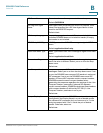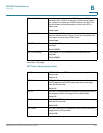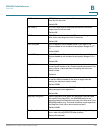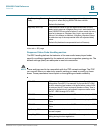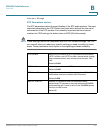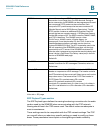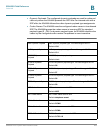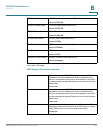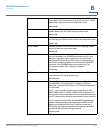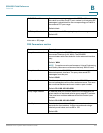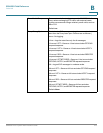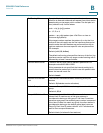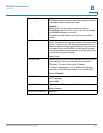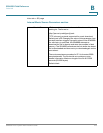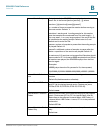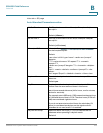
SPA9000 Field Reference
Voice tab
SPA9000 Voice System Administration Guide 211
B
Insert VIA rport Inserts the rport parameter into the VIA header of SIP
responses if the received-from IP and VIA sent-by IP values
differ. Select yes or no from the drop-down menu.
Default: no
Substitute VIA Addr Lets you use NAT-mapped IP-address port values in the VIA
header. Select yes or no from the drop-down menu.
Default: no
Send Resp To Src Port Sends responses to the request source port instead of the
VIA sent-by port. Select yes or no from the drop-down menu.
Default: no
STUN Enable Enables the use of STUN to discover NAT mapping. Select
yes or no from the drop-down menu.
Default: no
STUN Test Enable If the STUN Enable feature is enabled and a valid STUN
server is available, the SPA9000 can perform a NAT-type
discovery operation when it powers on. It contacts the
configured STUN server, and the result of the discovery is
reported in a Warning header in all subsequent REGISTER
requests. If the SPA9000 detects asymmetric NAT or
asymmetric firewall, NAT mapping is disabled.
Default: no
STUN Server IP address or fully-qualified domain name of the STUN server
to contact for NAT mapping discovery.
Default: blank
EXT IP External IP address to substitute for the actual IP address of
the SPA9000 in all outgoing SIP messages. If 0.0.0.0 is
specified, or the field is left blank, no IP address substitution
is performed.
NOTE You must also configure port forwarding for SIP
[5060-5063] and RTP [16384-16482] when using the EXT IP
field, or phone users may experience one-way audio because
the RTP stream will not find its way between the two phones.
If this parameter is specified, the SPA9000 assumes this IP
address when generating SIP messages and SDP (if NAT
Mapping is enabled for that line). However, the results of
STUN and VIA received parameter processing, if available,
supersede this statically configured value.
Default: blank



